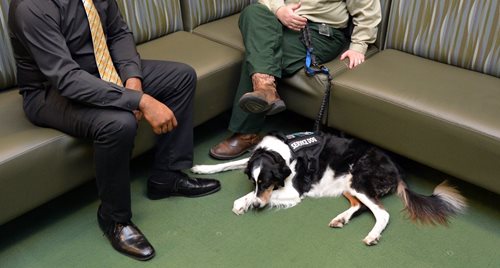Thanks to the ADA – Sarah’s Story
Sarah* has a unique bond with her dog, Hugo, because he is her service dog. Hugo performs tasks that help Sarah manage her PTSD and Dissociative Disorder symptoms. Hugo has been trained to recognize when Sarah begins to have a dissociative episode. He then nudges her to help lessen the symptoms of it. Hugo is vital to Sarah’s mental health, stability, and independence.
Recently, Sarah decided to seek in-patient treatment to focus on her mental health and well-being. However, the treatment facility would not allow Hugo to accompany her, and Sarah had to kennel him. Without Hugo’s support, Sarah was not able to fully participate in her treatment at the facility.
“Amidst all the chaos of seeking treatment and moving around and balancing life and mental health, Hugo has been the only anchor,” says Sarah. “Not having him at the treatment center meant that not only was I in an environment that was new and terrifying leaving me constantly hypervigilant, I felt like I had been stripped of the one thing in my life who could make me feel safe.”
The ADA allows service animal users to take their service animals with them to public and private places. Service animals are defined as dogs and miniature horses under the ADA. A business cannot ask to see a service animal’s “papers” or require that the service animal wear a vest. Thanks to the ADA, Sarah was able to educate her health care provider about service animals and Hugo with her to in-patient treatment. Sarah successfully completed the program. Today, she lives a happy and healthier life.
*not her real name

